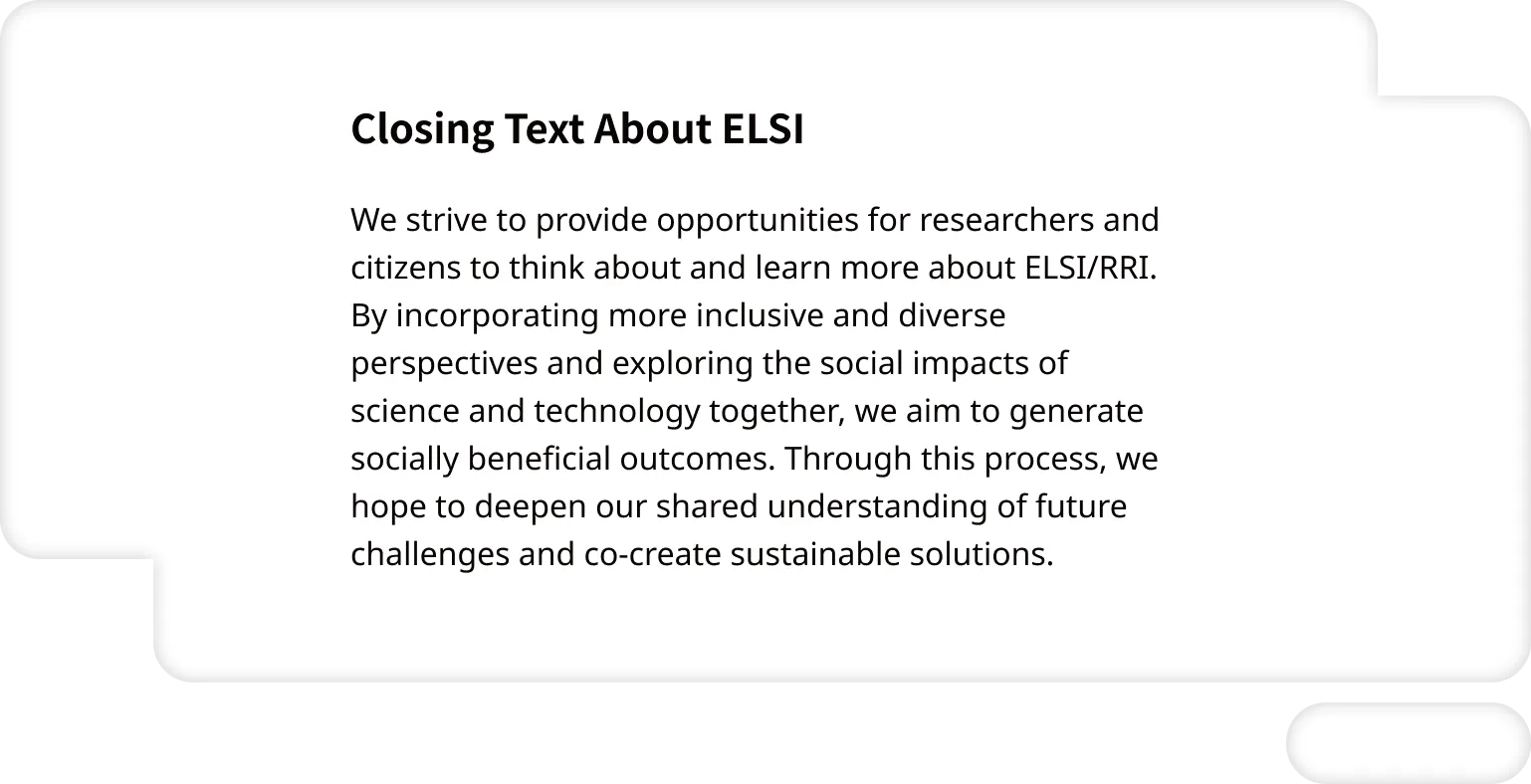About ELSI/RRI

ABOUT ELSI
ELSI refers to the ethical, legal, and social issues that arise from advances in science and technology. It is a field of study that examines how these advancements impact society, law, and our moral values.
ABOUT RRI
RRI (Responsible Research and Innovation) aims to ensure that innovations in science and technology align with societal needs and values. It promotes inclusiveness, sustainability, and ethical responsibility throughout the research process.
Consider from everyday items
Click or tap the magnifying glass illustration.
Hospital
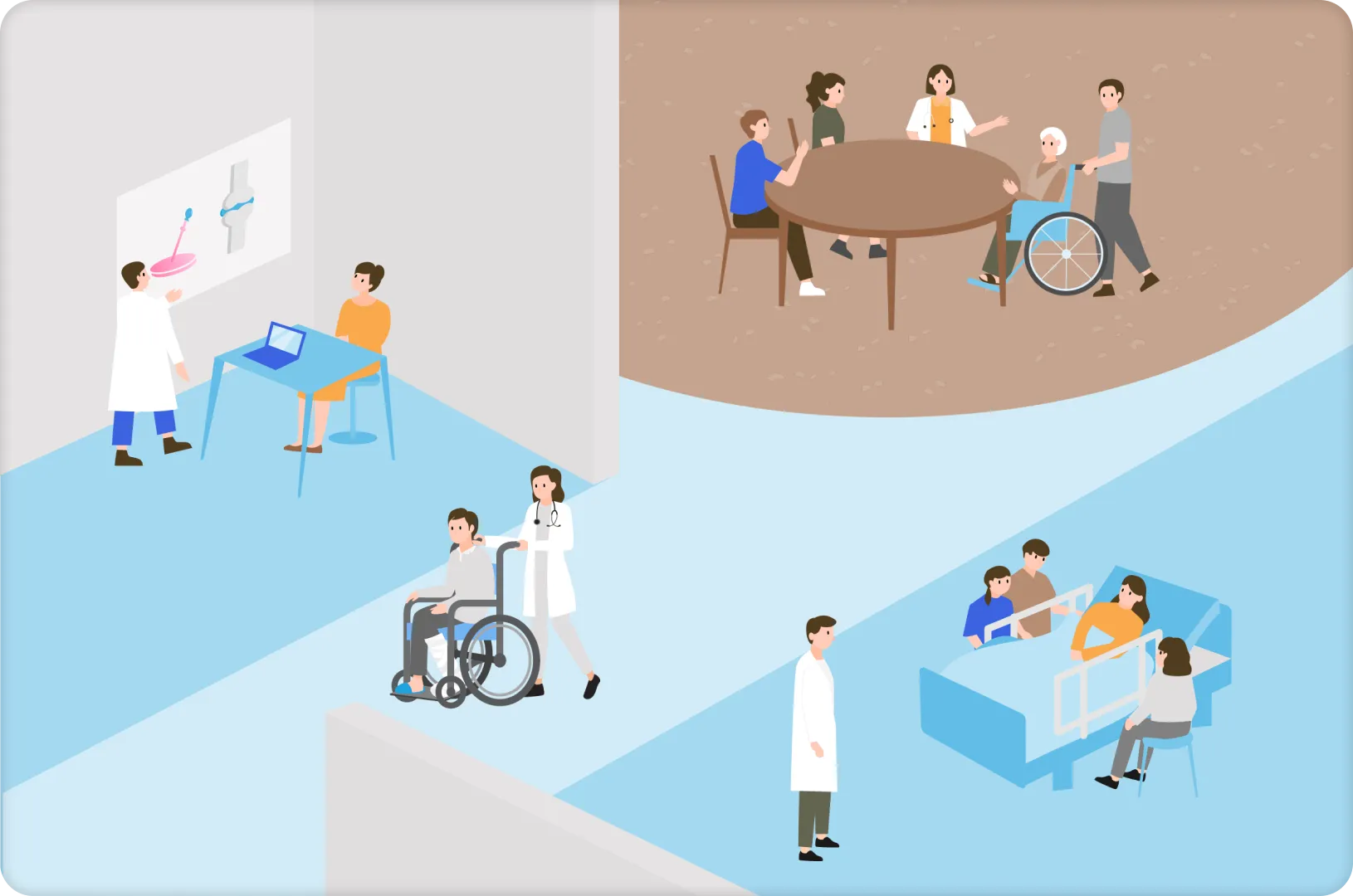
In the future, regenerative medicine may make it possible to replace dysfunctional organs with organs created from stem cells. However, during the research and development stage, issues such as participant protection and the evaluation of safety and efficacy arise. Additionally, legal regulations need to be established to address unproven treatments. Moreover, when such advanced treatments become available as medical services, it is important to ensure equal access to them.
PPI refers to scientific and medical research conducted in collaboration with or led by patients and the general public. By involving patients and the public in the planning and design of research, and in evaluating and deciding how the results will be used, research that benefits society can be realized. Patients and the public are expected to play an equal role as partners alongside researchers.
Advance Care Planning involves discussing and preparing with healthcare professionals how you would like to spend the final stages of your life. Even with advances in medicine, some terminal patients continue to suffer without effective treatments. To ensure a respectful end of life according to one’s wishes, discussions about issues like dignity and euthanasia, which lack formal structures in Japan, will be necessary.
Sea
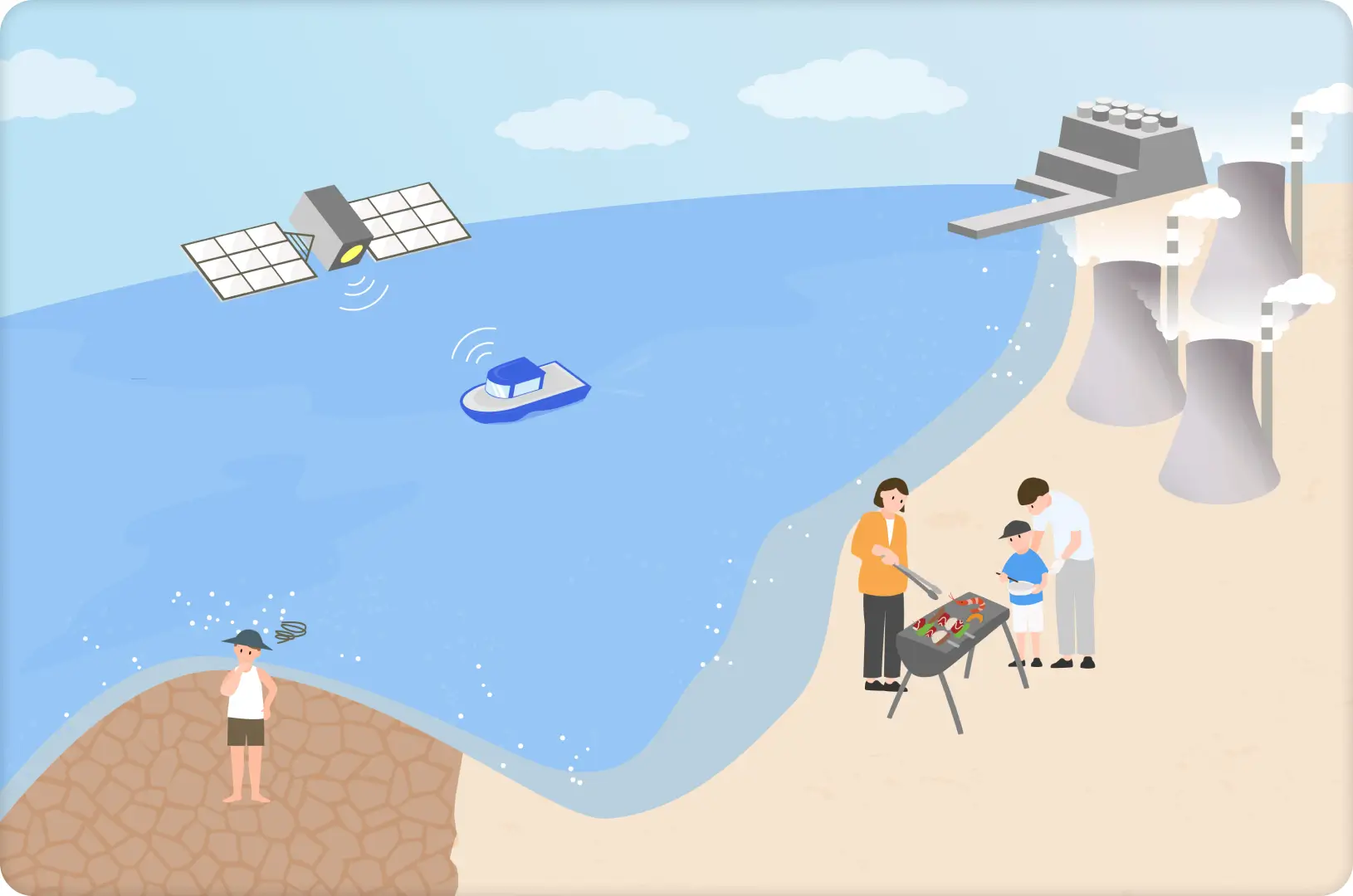
The use of space is expanding through GPS for location tracking and satellite-based internet access. However, old satellites and space debris pose the risk of collisions that could spread fragments in orbit, potentially making future launches difficult. Since the usable range of space is limited, regulations to ensure safe and sustainable use of space are being considered.
While nuclear power is supported for its stable energy supply and its potential to reduce CO2 emissions, concerns about its safety and sustainability have persisted for many years. The safe disposal of high-level radioactive waste generated during the decommissioning of nuclear reactors and power plants remains an unresolved issue. More than ten years after the Fukushima Daiichi Nuclear Power Plant accident, problems related to the restoration of surrounding areas and decommissioning processes remain unresolved.
Climate change refers to changes in climate patterns, including global warming. As global warming progresses, rapid environmental changes and intensified disasters are causing serious negative impacts on human society and ecosystems. In addition to exploring technical solutions to mitigate the effects of climate change, discussions on reducing dependence on fossil fuels, distributing the risks and costs of climate change, and how to fairly share the burden are ongoing.
Road
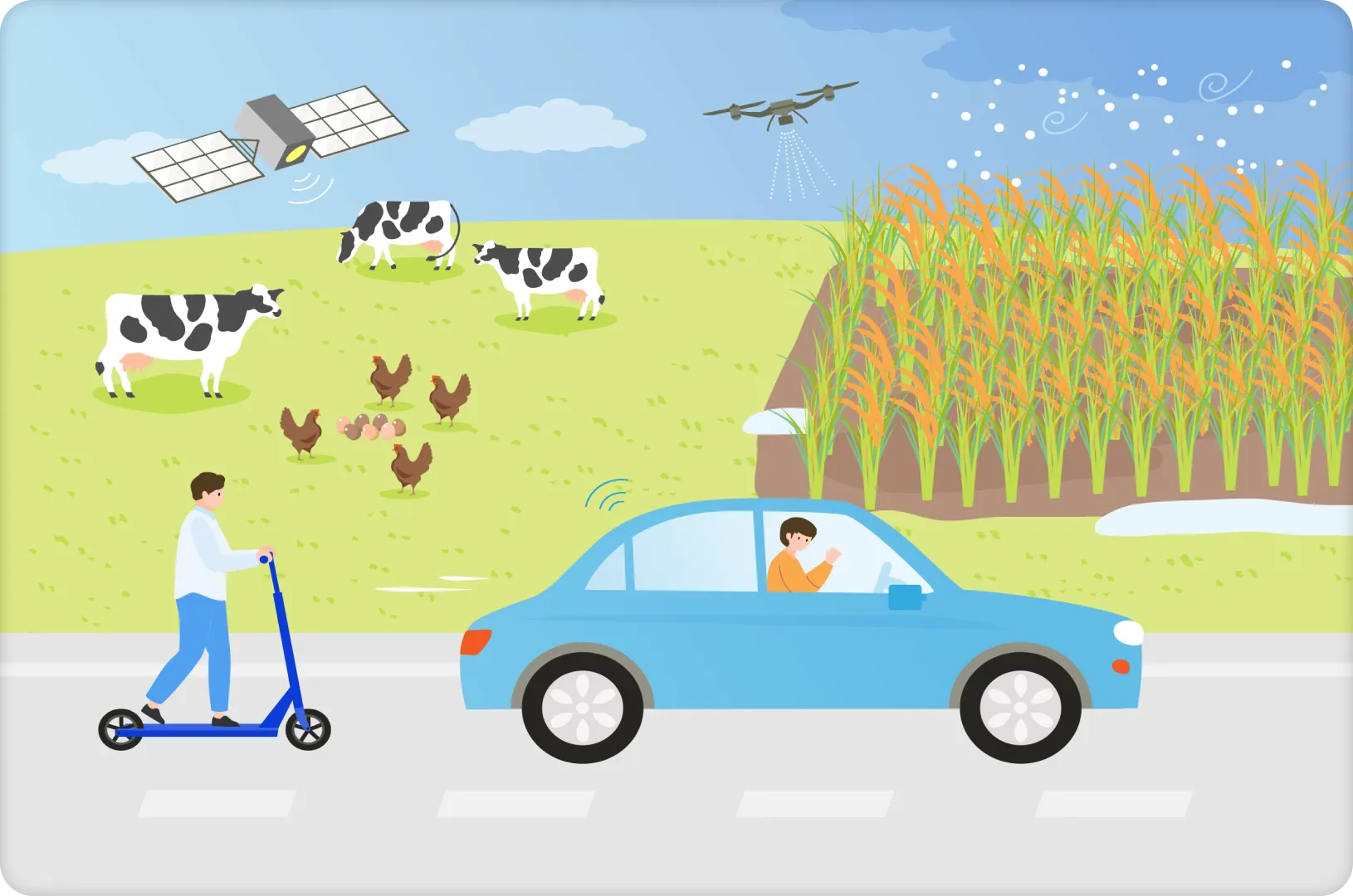
Genome editing in animals and plants holds the promise of producing food products that are allergen-free or enhanced with specific nutrients. However, concerns about safety and environmental impacts have been raised. The potential disruption of natural evolution due to genetic modification and the importance of providing accurate information to consumers are also pointed out. As we move toward the future use of such technologies in food production, it will be essential to consider ethical concerns and design food that is socially acceptable.
Drones have become more accessible than ever before and are being increasingly used for photography, transportation, and entertainment. With improvements in performance such as motion control, flight distance, and data communication, the potential uses for drones will continue to expand. However, issues such as safe operation and privacy protection must also be addressed. Given their everyday nature, it is important to consider better ways to use drones and to regulate them.
There is a long history of plant and animal breeding, involving random genetic mutations and genetic modification techniques. However, the advent of genome editing tools has made it possible to create plants with desirable traits (e.g., the ability to grow regardless of weather conditions). On the other hand, it is crucial to carefully consider the environmental and ecological impacts of such "improved" plants and animals.
Emerging mobility technologies such as self-driving cars, electric scooters, and autonomous delivery robots raise various ethical, legal, and social issues, such as ensuring pedestrian safety (especially for the elderly and children), responsibility in the event of accidents, privacy violations, and the need for legal frameworks. Additionally, these technologies increase the risk of sidewalk congestion and collisions, necessitating fair infrastructure development and social acceptance.
University
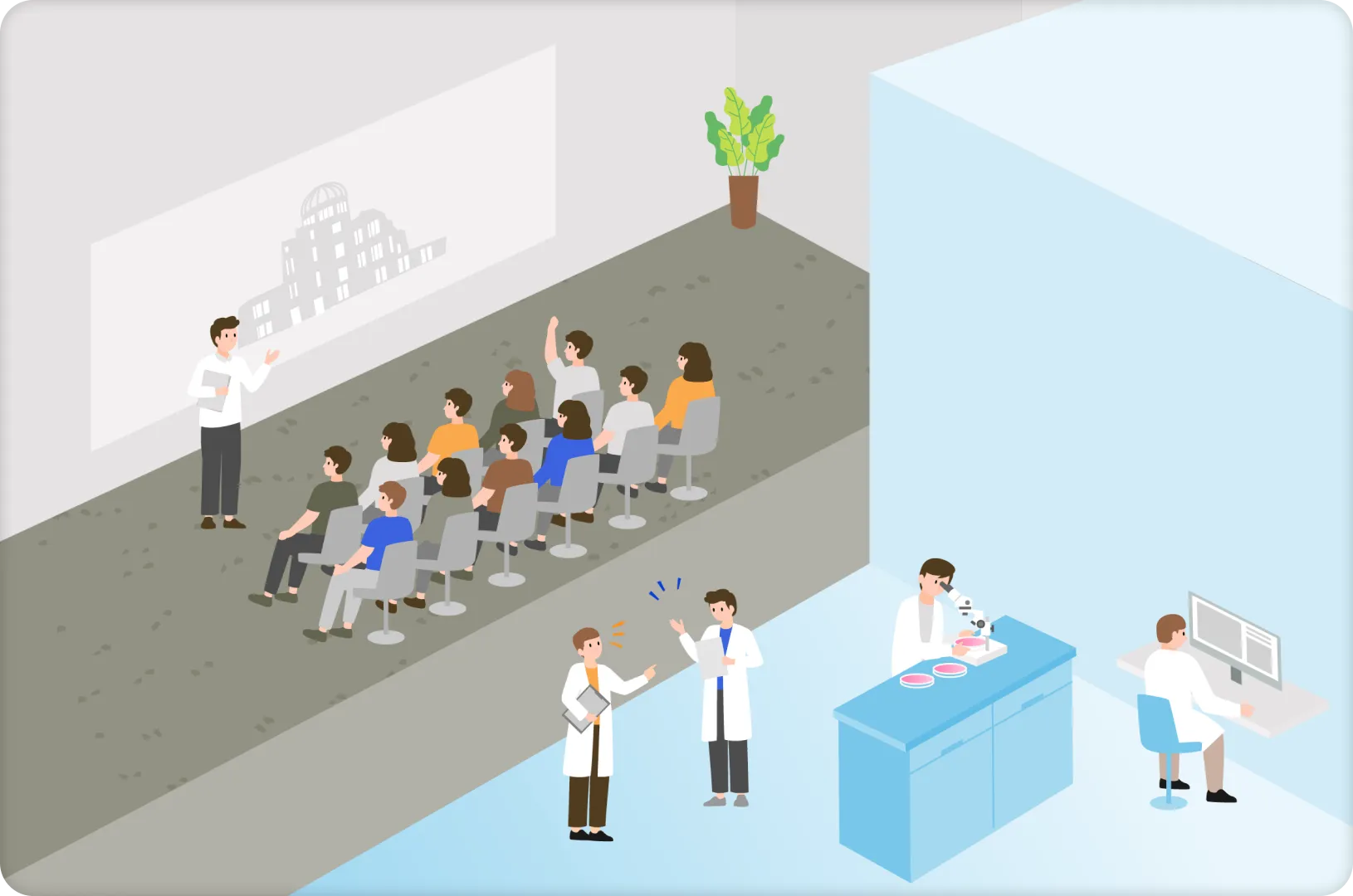
Dual-use refers to technologies that can be used for both military and civilian purposes (military-civilian duality) and technologies that can be beneficial for public use but also subject to misuse (moral duality). Managing dual-use technologies involves challenges such as balancing academic freedom with national security and evaluating the probability and impact of misuse.
Brain organoids are three-dimensional brain tissues created from stem cells, useful for studying brain development and diseases. However, concerns have been raised about whether more complex brain tissues might develop consciousness or sensory experiences, or whether the intelligence of animals might be enhanced if human-derived tissues are transplanted into them. Since brain organoid research spans multiple fields, it is important to consider the issues related to each field as research progresses.
Research misconduct includes inappropriate actions in research activities, such as fabrication, falsification, and plagiarism. These issues are not just academic concerns; products developed based on incorrect findings can negatively impact society as a whole. The issue of research misconduct is being examined globally, considering individual researcher ethics, the organization’s research environment, and public trust in research activities.
House

In addition to street surveillance cameras, much of our daily lives is recorded in the form of emails, social media posts, electronic payments, and smartphone location data. These records are primarily managed by corporations and governments, but they can be leaked or used for surveillance or censorship by corporations or governments under certain circumstances. It is important to engage in broad discussions about where to draw the line between convenience and surveillance.
AI is implemented in everyday devices such as computers and electronic appliances. In particular, conversational AI has advanced remarkably in recent years and is being used in various fields to support human activities, including education, research, work-related tasks, and creative activities. However, concerns about the potential negative effects of AI on society, such as the unintentional accumulation and analysis of personal data, need to be considered.
With the increasing number of internet users, massive amounts of data (big data) are being generated in real-time. Big data is statistically analyzed and used for various purposes in both business and research. However, as seen in discussions around the use of generative AI, individual pieces of big data may contain copyrighted materials or personal information, necessitating the proper use of data while respecting copyright and privacy.
Genetically edited food is making its way into the food industry and may soon appear on our tables. However, concerns about its safety and long-term health effects require thorough verification. It is also important to ensure proper information disclosure and labeling for consumers. Furthermore, the environmental impact and the potential disruption of natural evolution are topics of debate, necessitating the ethical development and appropriate regulation of such technologies.
